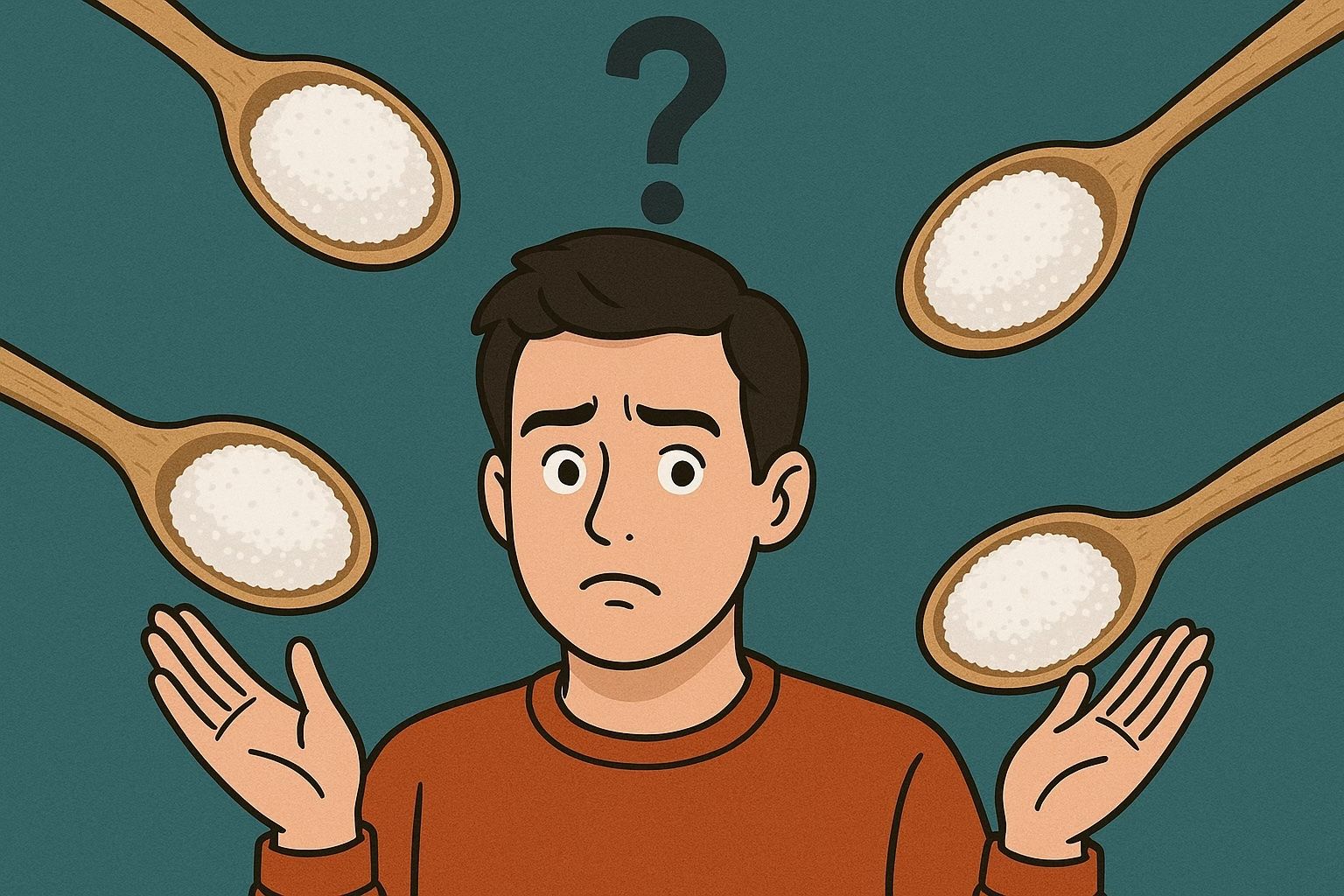Artificial Sweeteners (Aspartame, Stevia, Sucralose, Monk Fruit) and Diabetes: A Divided Debate
Published on 5/19/2025 · 📖 4 min read

Why Many People with Diabetes Use Artificial Sweeteners
Artificial sweeteners are typically low- or zero-calorie options that mimic the taste of sugar. This allows individuals to enjoy sweet flavors while managing carbohydrate intake and avoiding glucose spikes.
- Weight Management: These sweeteners can help reduce calorie consumption, supporting weight management—a key factor in diabetes care.
- Blood Sugar Stability: Stevia and monk fruit, in particular, are praised for not affecting blood glucose levels (Healthline, n.d.; WebMD, n.d.).
A Closer Look at Each Sweetener
Stevia
Stevia is a plant-based sweetener derived from Stevia rebaudiana. It has gained popularity for its potential benefits:
- Does not cause blood glucose or insulin spikes (Frontiers in Nutrition, 2024).
- May improve insulin sensitivity in some individuals.
- Contains antioxidant compounds.
Note: Most studies use whole stevia leaf, while the U.S. FDA only approves purified stevia extracts.
Sucralose
Commonly known by the brand name Splenda:
- Zero-calorie and heat-stable (often used in baking).
- Some studies suggest sucralose can raise insulin levels slightly (Pepino et al., 2015).
- May decrease insulin sensitivity and alter gut microbiota (Romo-Romo et al., 2023); (Diabetes, 2024).
- May negatively impact gut microbial diversity.
Aspartame
- Widely used artificial sweetener.
- Calorie-free and does not affect blood sugar directly (Horwitz et al., 1985).
- Some studies suggest links to weight gain and altered gut microbiota (Ashok et al., 2017); (Frontiers in Nutrition, 2024).
- Long-term safety remains under investigation (Debras et al., 2023).
Monk Fruit Sweetener
Derived from the monk fruit (Luo Han Guo), monk fruit sweetener is rapidly growing in popularity:
- Does not raise blood glucose or insulin levels (WebMD, n.d.).
- Contains mogrosides with potential antioxidant and anti-inflammatory properties.
- May support gut health with no known adverse effects.
- GRAS-approved by the FDA.
Consumer Tip: Some monk fruit products are blended with fillers like erythritol. Check labels to understand what's in your sweetener.
Health Concerns and Criticisms
Insulin Response
Some artificial sweeteners may trigger insulin release by stimulating sweet taste receptors—even without raising blood glucose. For example, sucralose was shown to increase insulin by 20% in a human study (Pepino et al., 2015).
Gut Microbiome Impact
Research suggests artificial sweeteners, particularly sucralose and aspartame, can alter gut bacteria and possibly affect metabolism (Diabetes, 2024).
Cravings and Appetite
Artificial sweeteners may confuse the brain’s satiety signals, potentially increasing hunger (Healthline, n.d.).
Long-Term Safety Unknowns
While these sweeteners are considered safe in moderation, some observational studies link high intake to increased risk of type 2 diabetes and metabolic disorders (British Journal of Nutrition, 2024); (Diabetes Care, 2023).
Sweetener Comparison:
- Stevia
- Effect on Blood Sugar: None
- Gut Health: Neutral or beneficial
- Benefits: May support insulin sensitivity
- Status: GRAS (FDA)
- Sucralose
- Effect on Blood Sugar: None (some insulin response)
- Gut Health: Possible negative impact
- Benefits: Heat stable, widely available
- Status: FDA approved
- Aspartame
- Effect on Blood Sugar: None
- Gut Health: Possible negative impact
- Benefits: Widely used, zero calorie
- Status: FDA approved
- Monk Fruit
- Effect on Blood Sugar: None
- Gut Health: Neutral or beneficial
- Benefits: Antioxidant, gut-friendly
- Status: GRAS (FDA)
Key Takeaways for Consumers
- Moderation is Key: Sweeteners can help reduce sugar intake, but overuse may have downsides.
- Individual Differences: Monitor your body’s reaction to various sweeteners.
- Monk Fruit and Stevia Stand Out: These two options have the most favorable profiles based on current research.
- Check Product Labels: Some sweeteners are mixed with other substances that may affect blood sugar.
- Talk to Your Provider: Discuss dietary changes with your healthcare professional.
References
- Healthline. (n.d.). Sucralose and Diabetes: Know the Facts
- Romo-Romo, A., et al. (2023). PMC Article
- Pepino, M.Y., et al. (2015). PubMed Study
- Medical News Today. (n.d.). Sucralose and Diabetes
- Romo-Romo, A., et al. (2024). Diabetes Journal
- Horwitz, D.L., et al. (1985). PubMed Study
- Ashok, I., et al. (2017). PubMed Study
- Debras, C., et al. (2023). Diabetes Care
- Frontiers in Nutrition. (2024). Artificial Sweeteners and Diabetes
- British Journal of Nutrition. (2024). Study on Sweeteners
- WebMD. (n.d.). Monk Fruit Overview
Author Bio: This article was written by a GlucoSpike wellness writer specializing in nutrition science communication. This content is for educational purposes only and does not replace professional medical advice.
 GlucoSpike AI
GlucoSpike AI